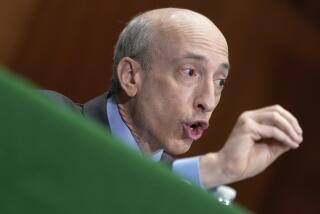NYSE Board Approves Plan to Expand Electronic Trading; Blessing by SEC Pending
- Share via
NEW YORK — The board of the New York Stock Exchange approved a plan Thursday to expand its use of electronic trading, a potentially significant departure for a 211-year-old marketplace that has always favored human traders over machines to buy and sell stocks.
The move addresses criticism from large institutions such as mutual funds, which have long wanted a more automated system to make trading faster and easier.
“This is something that we need to do,” John A. Thain, the NYSE’s new chief executive, said at a late-afternoon news conference.
But as soon as the initiative was unveiled, some critics questioned whether it would be much of an improvement.
Only some orders would be eligible for computerized execution. The so-called inside spread -- the highest offer to buy a stock and the lowest offer to sell it -- could be traded electronically. But the mass of orders that are not at the best price could not.
That could be a hindrance for institutions buying and selling large share blocks, said Junius Peake, a market expert at the University of Northern Colorado.
For example, a mutual fund trying to buy 5,000 shares would not be helped much if only 100 shares were available at the inside spread. If another 4,900 were offered for a penny more, the mutual fund could not swoop in and fill both orders at once.
“The way they’re limiting it, it doesn’t seem like they’re dealing with the real issue,” Peake said.
The exchange wants to see “how this takes off” before expanding automatic execution to other orders, Thain said.
The plan has been endorsed by NYSE trading firms and must be approved by the Securities and Exchange Commission, he said.
The NYSE board also approved a plan that would make it easier for a company that is unhappy with the “specialist” firm handling the trading in its stock to switch to another firm. Specialists are the auctioneers who oversee the trading of individual stocks.
Also Thursday, Thain said salaries for top NYSE executives were being cut an average of 10% to 20% in response to the scandal over former NYSE chairman Richard Grasso’s compensation.
He added that the NYSE would not file its own lawsuit against Grasso to recover any of the $188 million in accumulated compensation he was paid in 2003.
The exchange has referred the issue to the SEC and to New York Atty. Gen. Eliot Spitzer, who is mulling over whether to sue Grasso. Thain also said the exchange had hired Amy Butte, a well-known former Wall Street stock analyst, to be its chief financial officer, at $500,000 a year.
More to Read
Inside the business of entertainment
The Wide Shot brings you news, analysis and insights on everything from streaming wars to production — and what it all means for the future.
You may occasionally receive promotional content from the Los Angeles Times.










